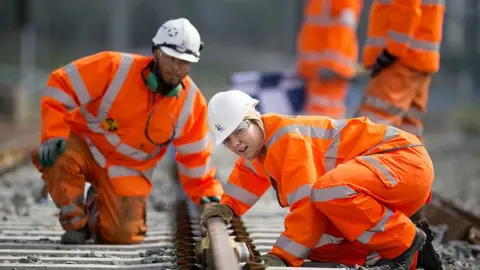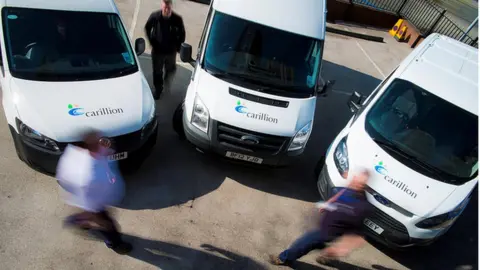Where did Carillion's problems come from?
 Carillion
CarillionMany people will ask exactly why Carillion has been awarded a contract to build part of the forthcoming HS2 high speed railway line.
A week ago the company shocked its investors, and the wider construction industry, by revealing that it had suffered a corporate heart attack.
It had to write off £845m in income it had previously expected from several big contracts, and it admitted that its already large borrowings were becoming bigger.
That forced it to take drastic action.
This year's dividends for shareholders were cancelled, the chief executive left, and now accountancy firm EY has been called in to help devise a rescue plan with some analysts speculating that the company will need to raise about half a billion pounds in extra funds just to survive.
According to one of those analysts, Sam Bland of JP Morgan, the specific contracts which have gone bad for Carillion include a hospital in Liverpool, a road in Aberdeen and a tramway in Sheffield.
Inflexible contracts have meant that extra costs could not be passed onto customers, leading to a big dent in the firm's expected income.
 Carillion
CarillionMeanwhile some clients with big Middle East contracts appear to have been slow to pay their bills or to have not paid at all.
The result, said Mr Bland, is that the amount of money which the company has earned, but which has not yet been paid, has been growing over the past few years.
The fact that these so-called receivables (as accountants call them) have been rising is a "very, very bad sign," Mr Bland said, as it leads to income and profits being booked in the accounts before cash has been received.
If the money then does not appear at all, a crisis ensues.
It appears that Carillion's strategy for the past couple of years was to try to out-run its growing cash and debt problems but within the firm it became clear that this would not work.
The accountants KPMG were called in earlier this year to review the position of the firm's big contracts and two weekends ago gave the board the bad news that huge sums would need to be written off.
"There was still surprise at the large size of the problems," Mr Bland said.
The company had been trying to help itself by extending its payment times to contractors from 80 days to 120 days.
Along with the growing "receivables" these problems had been spotted by hedge funds which had been selling short the company's shares in the expectation of making a big profit if the share price collapsed - which it has.
What now? Mr Bland says the company's financial position is "very unclear".
"You could conclude that the equity value of the company is zero", he added.
What if Carillion goes bust or has to sell off the division that will actually build the tunnels and bridges for part of the new railway?
A spokesman for HS2 said it had sought assurances from Carillion's partners on the rail project that they can step in to deliver on the work if necessary
Tom Fitzpatrick, editor of the leading trade journal Construction News, argued that the timing of the award, just a week after Carillion revealed its deep troubles, is a sign of some government confidence.
"If the government had had doubts it would have been loath to award the contract," he said.
"The HS2 project is so high profile, involving so much money and so many opponents, and with the failure of a contractor able to cause such large delays and massive headaches, the government would not have awarded it if Carillion was on the verge of going under," Mr Fitzpatrick said.
So far, stock marker investors share that opinion.
Carillion's shares are up 20% on the day - so far.
